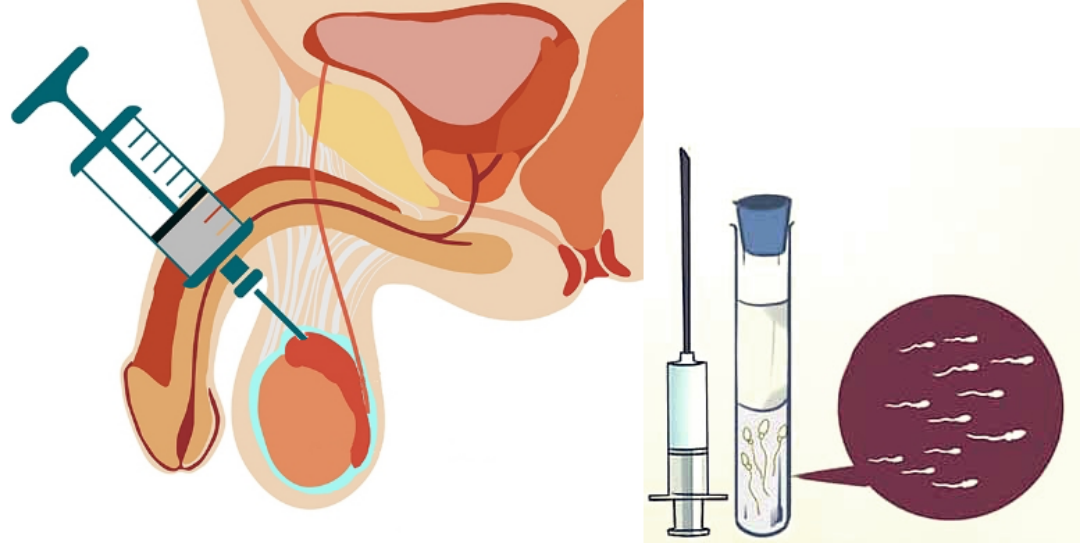PESA (Percutaneous Epididymal Sperm Aspiration)
A targeted sperm retrieval technique for men with obstructive infertility.
What is PESA?
PESA (Percutaneous Epididymal Sperm Aspiration) is a straightforward and effective procedure used to retrieve sperm from the epididymis. This is a crucial step for men with obstructive infertility, where sperm production is normal but a blockage prevents it from being released during ejaculation. Using a fine needle, our specialists extract sperm directly from the epididymis, an organ located behind the testis that stores sperm. The retrieved sperm can then be used for an ICSI (Intracytoplasmic Sperm Injection) procedure as part of an IVF cycle. This minimizes the need for more invasive surgeries, making it a targeted and efficient solution for many couples.

The PESA Process: A Straightforward Procedure
PESA is a quick and minimally invasive procedure performed in our clinic, often with a high rate of success.
1. Local Anesthesia
The procedure is performed under local anesthesia to ensure you are comfortable. A fine needle is then used to access the epididymis.
2. Sperm Aspiration
Using the needle, our specialist gently aspirates (draws out) a small fluid sample from the epididymis. The fine-gauge needle minimizes discomfort and tissue damage.
3. Lab Analysis & Use
The fluid is immediately examined in our lab to identify viable sperm. The sperm can then be used for ICSI, or frozen for future use in subsequent IVF cycles.
Who Should Consider PESA?
Men with Obstructive Azoospermia
This is the primary group for whom PESA is recommended. In these cases, sperm production is normal but a blockage (due to prior surgery, infection, or congenital reasons) prevents ejaculation.
Part of an IVF/ICSI Cycle
PESA is performed as a part of a larger IVF cycle with ICSI, where the retrieved sperm is injected directly into the eggs. This ensures that the retrieved sperm is used immediately to maximize fertilization success.
Success Rates & Factors Affecting Outcomes
Success & Effectiveness
PESA is highly effective for men with **obstructive azoospermia**, with a very high success rate in sperm retrieval. Because the sperm is retrieved directly from the epididymis, it is often of high quality and can be successfully used in an IVF/ICSI cycle to achieve a pregnancy.
The primary factors affecting the outcome are the quality of the sperm retrieved and the overall health of the female partner. Our team will provide a personalized assessment to give you a clear understanding of your chances.
Risks & Limitations of PESA
PESA is a minimally invasive procedure, but as with any medical intervention, there are some minor risks. Patients may experience slight discomfort, bruising, or swelling in the scrotal area after the procedure, which typically subsides within a few days. The main limitation is that PESA is not suitable for cases of **non-obstructive azoospermia**, where Micro-TESA would be the more appropriate treatment.
Our commitment to transparency means we will discuss all potential risks and limitations with you during your consultation to help you feel confident and informed.
Cost of PESA in Dombivli
The cost of PESA is a key consideration for many couples. The overall cost can be influenced by several factors, including the clinic's fees, anesthesia costs, and the need for a concurrent IVF/ICSI cycle. Because PESA is less invasive than other surgical retrieval methods, it is often a more cost-effective option for men with obstructive infertility.
During your initial consultation, our team will provide a transparent and detailed breakdown of all costs. We are committed to making this journey as clear and financially manageable as possible for you.
The Isha Advantage: Why Our PESA Success Stands Out
At Isha Women's Hospital, our precise technique and experienced team give you the best chance of a successful outcome.
Minimally Invasive
PESA is a quick, minimally invasive procedure with a fast recovery time, allowing you to return to normal activities sooner than with more complex surgeries.
Specialized Expertise
Our team, led by Dr. Chinmay Pataki, is highly experienced in PESA and male fertility procedures, ensuring the highest level of care and precision.
Integrated Lab Services
The aspirated fluid is immediately analyzed in our state-of-the-art lab to identify viable sperm, ensuring the best possible outcome for your ICSI cycle.
Holistic Patient Support
We understand the emotional journey of male infertility and provide comprehensive support and guidance every step of the way.
Meet Our Founder & Leading Specialist

Dr. Chinmay Pataki
M.D GYNEC, IVF Specialist
Dr. Chinmay Pataki, the founder of Isha Women's Hospital, is a renowned specialist in fertility, gynecologic laparoscopy, and high-risk pregnancies. His journey is marked by excellence, including being a university rank holder and a Gold Medalist in M.D. Gynecology.
He has trained at world-class institutions, including Weill Cornell Medical College in New York for male infertility and Micro-TESA for zero sperm count, and in Germany and Italy for advanced laparoscopic surgeries. With over 10,000+ IVF cycles and 15,000+ laparoscopies to his name, Dr. Pataki's expertise ensures that you are in the most capable hands. He is a true pioneer in reproductive healthcare, dedicated to helping both women and men on their path to parenthood.
Frequently Asked Questions
What is obstructive Azoospermia?
Obstructive Azoospermia is a condition where a man produces sperm normally, but a blockage in the reproductive tract prevents the sperm from being released in the ejaculate. PESA is specifically designed to retrieve sperm in these cases.
Is PESA painful?
No, the procedure is performed under local anesthesia, so you will not feel any pain. You may experience some mild discomfort or tenderness in the area for a day or two after the procedure, which can be managed with medication.
How long does PESA take?
PESA is a quick, outpatient procedure that typically takes about 20-30 minutes to complete. The recovery time is minimal, and most patients can resume normal activities within a day.
Does PESA retrieve enough sperm for ICSI?
Yes, PESA is highly effective in retrieving a sufficient number of healthy, motile sperm for use in an ICSI procedure. Our lab team works in real-time with the procedure to ensure an adequate sample is collected.
What is the cost of PESA?
The cost of PESA is significantly lower than more invasive surgical procedures. It is typically a part of a larger IVF/ICSI cycle, and our team will provide a detailed and transparent cost breakdown during your consultation.
What if no sperm is found during PESA?
In cases where no sperm is retrieved with PESA, it may indicate a different underlying cause of infertility, such as non-obstructive azoospermia. Our team will discuss alternative options with you, including Micro-TESA, which is a more advanced surgical procedure for sperm retrieval.
How is PESA different from Micro-TESE?
PESA retrieves sperm from the epididymis using a needle and is primarily for obstructive azoospermia. Micro-TESE is a more advanced microsurgical procedure that retrieves sperm directly from the testicular tissue, making it suitable for men with non-obstructive azoospermia.
Is PESA a one-time procedure?
PESA is performed as a single procedure to retrieve sperm for a fresh IVF/ICSI cycle. However, if excess sperm is retrieved, it can be frozen for use in future cycles, eliminating the need for another retrieval procedure.
Hear From Our Happy Families
Ready to Start Your Journey to Fatherhood?
Schedule a consultation to discuss if PESA is the right option for your fertility journey.
Book a Consultation